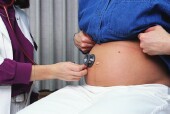- Are You Making This Expensive Thermostat Error This Winter?
- Recognizing the Signs of Hypothyroidism
- 10 Strategies to Overcome Insomnia
- Could Artificial Sweeteners Be Aging the Brain Faster?
- Techniques for Soothing Your Nervous System
- Does the Water in Your House Smell Funny? Here’s Why
- Can a Daily Dose of Apple Cider Vinegar Actually Aid Weight Loss?
- 6 Health Beverages That Can Actually Spike Your Blood Sugar
- Treatment Options for Social Anxiety Disorder
- Understanding the Connection Between Anxiety and Depression
Study Ties Antidepressant Use in Pregnancy to Autism Risk in Boys


Boys with autism were three times more likely to have been exposed to antidepressants known as SSRIs in the womb than typically developing children, according to new research.
The new study also found that boys whose mothers took SSRIs — drugs including Celexa, Lexapro, Paxil, Prozac and Zoloft — during pregnancy were also more likely to have developmental delays.
Results of the study were published online April 14 and in the May print issue of Pediatrics.
“We found prenatal SSRI exposure was almost three times as likely in boys with autism spectrum disorders relative to typical development, with the greatest risk when exposure is during the first trimester,” said study co-author Li-Ching Lee, an associate scientist in the department of epidemiology at Johns Hopkins Bloomberg School of Public Health, in Baltimore.
While the study found an association between prenatal use of SSRI antidepressants and autism risk in boys, it did not prove cause-and-effect.
The study authors were quick to point out that there are risks to both the mother and fetus from untreated depression.
“It’s a complex decision whether to treat or not treat depression with medications during pregnancy,” Lee said. “There are so many factors to consider. We didn’t intend for our study to be used as a basis for clinical treatment decisions. Women should talk with their doctors about SSRI treatments.”
Other experts said the overall risk of having a child with autism remains very low.
SSRIs used during pregnancy cross the placenta and increase levels of the hormone serotonin in the fetus, as they do in the mother, the researchers said. Higher serotonin levels decrease depression, and these antidepressants are used in about 4 percent of all pregnancies, according to background information with the study.
About one in three children with autism has higher-than-normal serotonin levels. Researchers think these high levels may lead to the development of abnormal brain circuitry, which may play a role in the development of some autism symptoms, according to the study authors.
The new study is the latest in an ongoing debate about SSRI use during pregnancy and its possible association to autism spectrum disorders. Other studies on SSRI use in pregnancy have produced conflicting findings.
One study published in the November 2011 Archives of General Psychiatry that included nearly 300 children with autism spectrum disorders found double the risk of autism when the mother had used SSRIs, with a stronger link to SSRI use during the first trimester.
Another study, published in the Dec. 19, 2013 New England Journal of Medicine, included almost 4,000 children with autism spectrum disorders. This study didn’t find a significant association between autism and SSRI exposure during pregnancy.
The current study included 966 mother-child pairs. Nearly 800 children were male. The average age of the children at the time of the study was nearly 4 years. About 500 of the children had an autism spectrum disorder, 154 had some type of developmental delay and 320 were typically developing children.
SSRI exposure was lowest in the typically developing children, with just 3.4 percent exposed during pregnancy. For those with autism, SSRI exposure occurred in 5.9 percent of pregnancies and SSRI exposure occurred in 5.2 percent of pregnancies for children with developmental delays.
When the researchers looked at boys and girls together, there was a trend toward a higher risk of autism and developmental delay. Lee noted that most of the study children were male, and said that they’d need a larger sample with more girls to get a better idea of the overall risk.
However, when the researchers separated the data on boys and girls, they found that boys with autism were three times more likely to have been exposed to SSRIs in pregnancy, and the rate was highest for those exposed during the first trimester, according to the study.
The study authors also found that boys with developmental delays were three to five times more likely to have been exposed to SSRIs during pregnancy compared to typically developing children. Rates were highest with exposure during the third trimester.
“This study suggests that there are some risks associated with SSRI exposure and that the risk is higher in boys. They [the study authors] also found the risk is highest with exposure during the first trimester when early brain development is occurring,” said Dr. Eric Hollander, director of the autism and obsessive-compulsive disorder program at Montefiore Medical Center, in New York City.
Hollander noted that even if other research confirms the much higher risk for boys after SSRI exposure, women should know the risk is still low. “If the risk of autism is around 1 percent now, and you raise it to 3 percent, that still means that 97 percent of the time, you won’t have an autism spectrum disorder. The chances are still overwhelming that they won’t have a child with an autism spectrum disorder,” he said.
Reproductive psychiatrist Dr. Ariela Frieder, also from Montefiore Medical Center, said this study’s findings won’t change her clinical practice.
“[This study] shows an association between the use of SSRIs and autism spectrum disorders. However, association does not mean causation, and this is very important for women to understand,” she said.
Dr. Eyal Shemesh, chief of behavioral and developmental health in the department of pediatrics at the Mount Sinai Kravis Children’s Hospital, in New York City said: “It’s very hard to do a definitive study of this. The confounders here are huge. They [the study authors] initially found no difference between the groups — it was only when they looked specifically at gender-adjusted differences that they saw an association. We still don’t know whether SSRIs are associated with more autism. We need to look further.”
Shemesh added: “The one thing we really know with certainty is that depression is not good for pregnancy. Women who are depressed have bad outcomes and their kids don’t do well. We need to treat depression, and there are psychotherapy options and medication options. You need to make a reasoned decision with your doctor. I would be very concerned about any woman just stopping her medication.”
Montefiore’s Frieder agreed that untreated depression is a serious risk, and recommended that women discuss the choice with their doctor and have an individualized risk/benefit assessment.
A report from the U.S. Centers for Disease Control and Prevention last month said that one in 68 American children is now diagnosed with autism or a related disorder, which is a 30 percent increase from just two years ago when the estimate was one in 88 children.
More information
Learn more about depression in pregnancy from the U.S. Office on Women’s Health.
Source: HealthDay
Copyright © 2026 HealthDay. All rights reserved.










